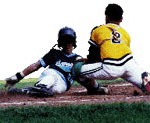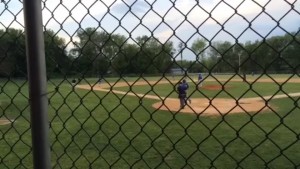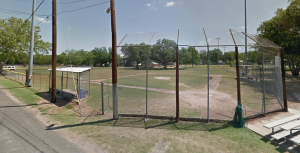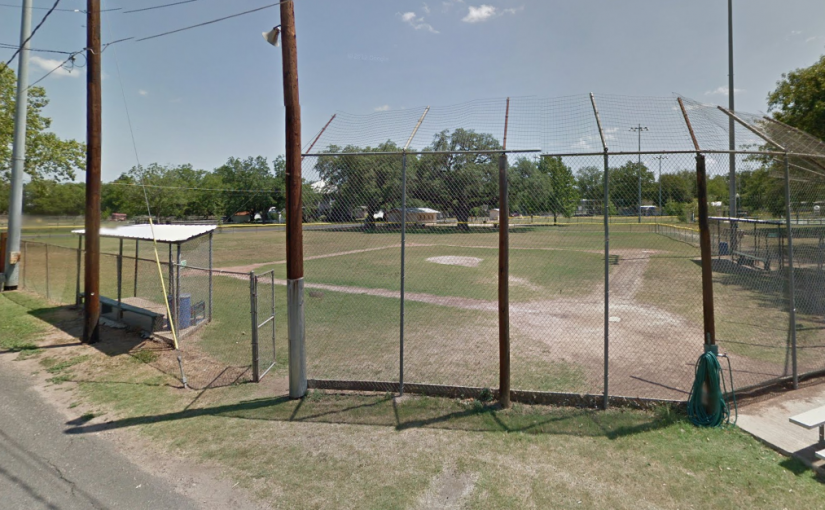There was only one organized sport for kids in Round Top in the 1980s. It came in the spring and took us through to summer, and gave us our first shot at competition, success, failure, and at a greater understanding of ourselves and our world. We only had enough players for one team, so we traveled to LaGrange to play in their league. We would face off against teams named the As and Yankees and Tigers. But we were always the Round Top-Carmine Cubs, and we always wore gold jerseys with black numbers, and we always had the same teammates and there was no need for tryouts because there were not enough of us to cut.
I remember those boys by name and I think about their smiles and their dirt-tracked necks, and I wonder at who they were… at who we were. And I hope they are doing well today and that they have found their place in the world.

When the dull buzzer announced the end of school at 3:30, we would hedge the gravel circle drive where buses and cars carried the others home, and walk the fifty yards to the worn field. We started practice on our own, warming up our arms and taking turns batting and goofing off more than we worked until Coach arrived.
There was a particular boy I recall who always tried, but more often than not failed in spite of his trying. I’ll call him Bo. Bo was tall and skinny and freckled and smiled all the time and spoke with a bit of an impediment, and you could see he had a heart of gold. When Coach said you can do it, Bo believed him. He seldom started a game, but Coach made sure Bo played, usually right field where not many balls fell.
We would stand there and wait while Coach worked with Bo at the plate to get him to shift his weight forward when he swung the bat. Over and over and over, us just standing there, me chewing the salty leather strap on the thumb edge of my glove, and Bo never quite getting it but never giving up, either. He always had a smile. And Coach seemed to say to Bo, almost as a mantra, “You have to swing to hit!” And Bo would say in his slurred way, “I can do it, Coach.” And yet he never could quite get the timing right to make contact with the ball.
Truth be told, I wasn’t much better. I couldn’t hit to save my life. Oh, I might get a few good shots in practice, and I might get the bat on the ball enough to ground out in a game, but I just couldn’t quite put all the pieces together when it mattered. Coach would clap his hands the way he did and nod and call my name and say, “You can do it!” But I could not. The best I could hope for when my turn at bat came was a walk. That’s just the way it was.
There were some great ball players on that little team, and then there was Bo and me. And somehow despite Bo striking out and me hoping for a walk every time we batted, the RTC Cubs wound up in the championship game with the Dodgers at the end of the season.

Some of us met at the elementary or at the courthouse to save on the number of cars and we would caravan out on what was once the old La Bahia Road, past what is now the Junk Gypsy 40, rolling with anticipation down through the towns of Warrenton and Oldenburg and Rutersville. We merged onto Highway 71 on the limits of LaGrange in front of the slaughterhouse and eased straight through downtown by the rock jail that had sat that town since the 1880s. We turned right on the last street before you hit the tight double-lane iron bridge that spanned the Colorado, and we parked on the street, shining cars and trucks all lined up in the late afternoon sun and shimmering with heat running off their hoods and tops.
By the time the lights popped and buzzed to life in the dusk we were down 7 to 5 and I was on deck, swinging an aluminum bat with a doughnut weight wedged on the shaft. I had swung only twice in the four times I had been to bat, and had struck out every time. The pitcher was good and fast and was putting the ball where he wanted.
It was the bottom of the fifth inning and the boy in front of me hit a double to right field on a full count. I was up. There were already two outs. If I struck out again, we would go to the final inning down by two runs, a near impossible deficit.
I pinched the skin of my inside bottom lip between my teeth and pounded the doughnut weight off the bat and walked to the plate. I set up in the batter’s box, wedging my foot as far back as I could without being on the chalk line and reached down and grabbed a handful of sand and wiped it along the grip of the bat and adjusted the helmet on my head and tried to breathe.
I looked at him on the mound and knew he was better than me. There were no two ways about it. His eyes were black in his head and his face thin and his cheekbones high. He looked like a snake. I knew how this would play out, had known. Some things never change. I beat the bat on the plate and shouldered it with my right elbow high and heard Coach say, “You can do it.” I glanced at him and his eyes were focused, hopeful, believing.
The first pitch came hot and hissing and passed me by on the outside corner without me swinging and popped in the catcher’s mit. The umpire pointed with his right hand and called a strike. I stepped out with my left foot and looked to Coach on the third-base foul line and at the runner on second. Coach nodded and said, “You have to swing to hit! You got it. Let’s go.”

I put my left foot back in and tapped the plate and bit my lip and got my right elbow up. The pitcher kicked high and heaved and the ball came straight for my head. I ducked back and closed my eyes and heard the ball hiss just by my right ear and pop home.
The next throw was high and outside. It got past the catcher and the runner advanced to third, Coach giving him a high-five as he reached the bag. The pitcher threw a third ball on the next pitch and I was ahead in the count, with only one strike, and I thought he must be losing control. He wiped sweat from his brow and the catcher to my right said, “Time for you to sit down, punk.”
And the pitch came again at my head and I ducked only to see it curve down and away and cross directly over the center of the plate. The umpire called strike and the count was full. I bit my lip again and tasted copper and looked at Coach, him clapping and saying something I couldn’t hear over the noise of the crowd.
This was it, I said to myself. You have to swing to hit.
The pitcher pulled up and cocked his leg and the ball was coming and it was low and I knew I had a walk. But I felt my hands tense and my wrists begin to move forward and I had a split-second realization that I was about to throw away a perfectly good walk and strike out yet again. The ball hit the front lip of the plate and bounced up and I let the bat follow it down like a golf swing. The fat part of the bat caught the ball and it shot out and up, straight over the pitcher and second base and I threw the bat and ran. The ball dropped in front of the center fielder and the runner on third crossed home plate and I held at first.
I couldn’t believe it. I blew out a breath that felt years in the holding and smiled and saw Coach and Mom clapping in the stands and smiling back. I got stranded there on first when the next batter struck out, but I didn’t care. I had my first ever real hit and it had come at the perfect time.
Our relief pitcher shut them out and we went to the bottom of the last inning down by only one run. By the time it was Bo’s turn at bat, the bases were loaded with two outs. The entire team was standing in the dugout against the fence and we and the crowd knew what was coming. No matter what Coach had said, no matter how much he had worked with Bo and told him he could do it, we knew Coach would put in a pinch hitter with the game on the line. It was the championship, after all. Bo hadn’t played the first three innings and then had struck out the two times he had been up with six straight swings. He simply did not know how to not swing.
The moment hung there in the night, the lights buzzing and the bugs arcing across the darkness, and we looked to Coach, waiting on him to call the timeout we knew was coming. And as we watched, Bo made his usual amble up to the plate and planted himself in the batter’s box and shouldered the bat, the helmet low on his eyes so he had to tilt his head back to see.
Grumbles started in our part of the stands and I heard a woman call out, “Pinch hitter, Coach!” The grumbles got louder and Coach clapped his hands and looked at Bo who was looking back at him and he said, “You’re up, Bo! You can do it. Let’s go.”
The groans in the stands grew louder and the boy to my left cussed and the boy to my right sat back down on the bench and I gripped the chain link in my fingers. The first pitch came fast and Bo swung and missed. Strike one.
The Dodgers fans were cheering and clapping and ours continued the low dissatisfied rumble and Coach looked at no one except Bo and clapped and said again to him, “You can do it!” I doubt Bo could hear, but he knew what Coach had said and he smiled and dug in again and swung again and missed again. Strike two.
“One more!” yelled the Dodgers’ coach over the din and their fans were on their feet clapping and yelling and so were their benched players and it all seemed so loud and frenzied and absolute and pre-written. Coach looked only at Bo, and Bo only at Coach, and then we all sat back on the bench in our dugout, me included, deflated.
But that was okay. We had a good run. We had played a good season. Second was a heartbreak, but all in all, it wasn’t so bad.
Coach had his arms crossed and his jaw was working, the muscles bunched tight under the skin. He had cast his lot and he would be judged by it. Bo bent his knees and sat back on his right knee and the pitcher kicked and delivered and Bo swung again.

And we heard the high-pitched tink of aluminum on hide and we came off the bench in a wave of wide open eyes. The ball traveled up and to the right in a low bow that took the ball just out of the first baseman’s reach. He stabbed his glove at the ball and missed and it dropped behind him and rolled down the right field line.
The Dodgers side of the stands went immediately silent and the RTC side exploded and the runners were all in motion and we were yelling and jumping up and down and I looked at Bo and saw him still standing there at home plate, his eyes on the ball where it lay on the right-field chalk line.
“Run!” I yelled. “Bo, run!”
Our third-base runner stepped around Bo and planted his foot on home plate and grabbed Bo and yelled at him to run and Bo finally took off for first base, the bat still in his hands. He was long and gawky and awkward and slow and he carried the bat across his body like a rifle as he ran, his head tilted so far back that the helmet dropped behind him and rolled in the sand.
The Dodgers right fielder finally got to the ball and palmed it and slung it toward the first baseman. But it was in the dirt and skittered past and Bo reached the bag just as our second runner crossed home and the RTC crowd and team were jumping and yelling and clapping and unbelieving what we were witnessing. In our frenzy, I saw Coach calmly walking across the field toward Bo, who stood on first base, the bat still in his hands, looking at us and at our crowd and at the Dodgers players staring at him in silence.
We bolted out of the dugout and by the time we got to Bo, Coach had him held up in the air in a bear hug, tears rolling down his cheeks, their faces all teeth and shiny and we tackled them both right there in a pile on top of first base.
We had done it. We had beaten the Dodgers and won the little league championship. And poor Bo, who couldn’t hit… who was the sure out… who never stopped trying… had somehow connected with an outside fastball and had won the little league championship for the RTC Cubs.

I learned that evening under the lights in LaGrange just out of sight of the Colorado River some fundamental truths. I learned that it doesn’t cost anything to believe in someone, but that it just might cost you not to. And that sometimes your belief in a person and in a code can change not only the course of events, but can in fact change the way you yourself and other people see the world, and in so doing can possibly change the world itself. I learned that the weakest player can get a winning hit against all odds, and that no matter the outcome, it is better to let your beliefs play out than to grab control and remove all possibility of a belief from revealing itself to you as truth.
From that day on, and into his adulthood, when Bo would see Coach in and around town and school activities, he would always ask Coach if he remembered that game. And Coach would smile at Bo and nod and I’m sure pride would fill his heart and so would that feeling of love and peace and full richness that can come only from watching God work, and from realizing you stood in the presence of something forever great and powerful and kind beyond our own predictions and understanding. And he would always say the same thing to Bo, and Bo got to where he would say it along in unison, knowing what was coming. “You have to swing to hit.”
